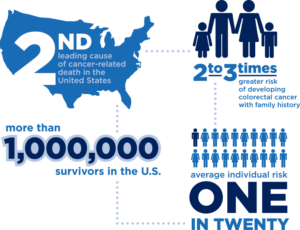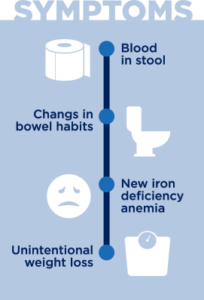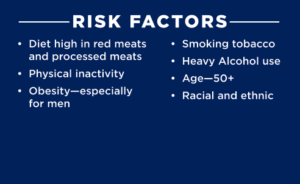For years, experts have recommended colorectal cancer screenings start at age 50. Recently, though, in light of more and more cases colorectal cancer is on the rise in young adults, the American Cancer Society, UPSTF, and GI societies recommend screening begin at age 45.
The numbers are pretty staggering. A study by the American Cancer Society found that colon and rectal cancer, commonly called colorectal cancer, occurs at a higher rate among young adults and those in middle age. 
Maybe the most stunning bit of information from the study? Those born in 1990 have double the risk of colon cancer and quadruple the risk of rectal cancer compared to those born in 1950.
What’s behind the drastic increase in cases of colorectal cancer among younger adults? Well, let’s take a look at some potential factors, as well as steps you can take to lower your risk.
Making Sense of Colorectal Cancer
Colorectal cancer is cancer that originates in either the colon or the rectum. The two cancers (colon and rectal cancer) are often grouped because they are similar.
Most cases of colorectal cancer begin as growths on the inner lining of the colon or rectum called “polyps.” These growths often begin as noncancerous but may evolve into cancer over time.
If a polyp becomes cancerous, it can spread within the wall of the colon or rectum and eventually even into nearby lymph nodes.
Precancerous polyps can be removed during a colonoscopy, the screening test for colorectal cancer. That’s why regular screening is essential, at intervals recommended by your physician — the polyps can often be removed before they develop into cancer or spread.
Colorectal Cancer on the Rise in Young Adults, Why?
Researchers don’t entirely know for sure why colorectal cancer is increasing among those in younger adulthood. But there is some thought that the continually growing rate of colon and rectal cancer — which has risen in every generation since the 1950s — is tied to changing lifestyle habits common among Americans.
There’s quite possibly a tie between obesity and colorectal cancer, as well as increasingly sedentary lifestyles and poor diets. Poor diet may be a significant risk factor since Americans now eat diets lower in fiber and higher in animal protein, increasing the risk of colorectal cancer.
Some studies have also found that increased cases of inflammatory bowel disease, or IBD, could be related to the rise in colorectal cancer. As the name describes, this condition involves increased inflammation in the body, which may be a factor in colon and rectal cancer.
The Changing Guidelines for Colorectal Cancer Screening
But while more young adults are being diagnosed with colorectal cancer, colorectal cancer screening has long been recommended only for older adults, beginning at age 50 and continuing at regular intervals after that. The only previous exception was if you were at a higher risk for the condition when you might require early or more frequent screenings. But that’s changing. Most
Americans should now have a colonoscopy at age 45 rather than 50, according to new guidelines released in 2021.
Future research and findings on the subject may require further changes, particularly if colorectal cancer incidence and death rates remain high among younger adults.
Signs to Watch Out For
But since colorectal cancer screening primarily isn’t recommended until age 45, what should younger adults do?
The best thing you can do is to carefully monitor your health — and report changes and concerns to your doctor promptly.
You’re looking for oddities primarily rated to the digestive system, so stomach-related symptoms such as:
- Abdominal pain
- Blood in the stool
- Constipation
- Diarrhea
- Unexpected weight
- Decreased appetite
- Changes in bowel habits
It’s imperative to monitor your health for these potential signs of colorectal cancer if you have a family history or are otherwise at high risk.
Ways to Lower Your Risk of Colorectal Cancer
 Beyond keeping an eye on your health, you can also lower your risk by mitigating the lifestyle factors mentioned above.
Beyond keeping an eye on your health, you can also lower your risk by mitigating the lifestyle factors mentioned above.
Live a healthier lifestyle by:
- Avoiding processed meats and limiting red meat
- Eating lots of fruits and vegetables and whole grains, which are high in fiber
- Exercising regularly
- Maintaining a healthy weight
- Avoiding tobacco
- Limiting alcohol consumption
If you’re experiencing any symptoms of colorectal cancer or are at a high risk of developing the condition, talk with your doctor. He or she can recommend screening if appropriate. For more information, visit our website or call Erlanger Gastroenterology at 423-778-4830.







